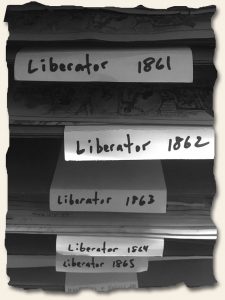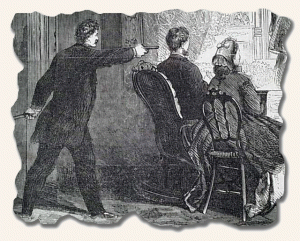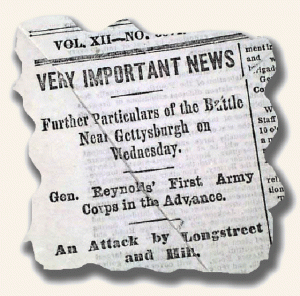I’m New Here: Week Thirty-Six…
November 1, 2019 by Stephanie Williams · Leave a Comment
 This week I discovered another section of the archives previously unexplored — actually, I didn’t even realize it was there.
This week I discovered another section of the archives previously unexplored — actually, I didn’t even realize it was there.
The walls in these connected buildings are shelved from floor to ceiling, as are the aisles and corridors. Inside those rigid 15′ dividers are movable racks that provide another layer of coordinates for filing archival folders of old and rare newspapers. It was here, highlighted by the angle of the tag, that I saw the title and date of voices for abolition. The Liberator issues that are housed here go as late as 1865, but I was interested in the ones that preceded the Emancipation Proclamation. What was being written and discussed by this publication from the “Anti-Slavery Office” in Boston in 1859? What was the tone prior to that April bombardment that marked the start of the Civil War?
The rag paper is full-sized (“folio”, in fact) and consists of four pages, mostly devoted to telling the stories of injustice and accounts that should provoke outrage. Headed by an illustration intricately representing people divided into groups based on the color of their skin, a banner curves along the bottom proclaiming, “THOU SHALT LOVE THY NEIGHBOR AS THYSELF” while a sign above a wooden structure crowded with human beings advertises, “Slaves, Horses & Other Cattle In Lots To Suit Purchase.” I feel the effectiveness of the graphics, of the pleading tone in the “Letter to Southern Ladies” and the headline which queries, “Shall Massachusetts Be Slave-Hunting Soil?” But what surprises me the most in this new acquaintance was the attitude toward the forerunner of Abraham Lincoln. A full front-page column is headed “PRESIDENTIAL FALSIFICATIONS”, and pulls no punches in its criticism of James Buchanan’s avoidance of the situation with the Free State Men of Kansas and the powerful politicians whose support of Slavery led to an effort summarized with, “The Missourians openly exulted in the sure prospect they had of making Kansas a slave state, in spite of the Free State men.”
I am looking forward to delving into the dates that discuss the events that followed — in all the permutations and compromises and regrets and triumphs. And I can’t help but wonder how much of a change anyone could have honestly expected after such a long period of such passionate division.
Most historic Civil War event (revisited)…
September 28, 2017 by GuyHeilenman · Leave a Comment
Continuing with our discussion on the “most historic” reports to be found in newspapers, we have been discussing the events of American history by era, the last being the post-Civil War 19th century. This post will discuss the Civil War era of 1861 – 1865.
discussing the events of American history by era, the last being the post-Civil War 19th century. This post will discuss the Civil War era of 1861 – 1865.
Of the many events of the 19th century which changed the course of American history few would argue that the Civil War was the most significant. But what single event during the Civil War would rank as the most significant? If you could only have one newspaper from the Civil War in your collection, what one event would you most desire?
There are a number of events to consider:
1) The election of Abraham Lincoln. Although it happened in late 1860 and not technically from the war, this event would would set the tone of American politics which would lead to the war. What would have happened had he not been elected?
2) The beginning of the Civil War in April, 1861, for obvious reasons.
 3) The Emancipation Proclamation of September, 1862, providing freedom to all slaves in all states, although more in theory than practicality.
3) The Emancipation Proclamation of September, 1862, providing freedom to all slaves in all states, although more in theory than practicality.
4) The battle of Gettysburg, as the turning point of the Civil War.
5) The assassination of Lincoln: how would the country been different had he not been assassinated and served out his 2nd four year term?
Perhaps other events should be considered as the most historically significant. What are your thoughts?
My vote would be for the battle of Gettysburg. If it was a given that a war was inevitable to settle the political, cultural & economic divide between the North & South, it’s arguable that the war’s end was decided at Gettysburg. The tide had turned in favor of the North and at that point it was just a matter of when it would end and not who would win.
What’s your thought?
The Traveler… The Emancipation… the last look… and today…
January 21, 2013 by The Traveler · Leave a Comment
 This week I traveled 150 years back in time and through the activities of the Civil War via the Harper’s Weekly dated January 24, 1863. This issue contains a double-page illustration by Thomas Nast entitled “The Emancipation of the Negroes, January, 1863 – The Past and The Future.” Mr. Nast shows their present life in the center circle, of a happy home including a picture of President Lincoln hanging on the wall. The illustrations to the left show obstacles they had to endure — being sold at auctions and separated from loved ones, beatings, and being chased (if running away). The illustrations to the right show what they are looking to in the future with the implementation of the Emancipation Proclamation — owning a home, children going to public school, being treated fairly by the employer and being paid for working.
This week I traveled 150 years back in time and through the activities of the Civil War via the Harper’s Weekly dated January 24, 1863. This issue contains a double-page illustration by Thomas Nast entitled “The Emancipation of the Negroes, January, 1863 – The Past and The Future.” Mr. Nast shows their present life in the center circle, of a happy home including a picture of President Lincoln hanging on the wall. The illustrations to the left show obstacles they had to endure — being sold at auctions and separated from loved ones, beatings, and being chased (if running away). The illustrations to the right show what they are looking to in the future with the implementation of the Emancipation Proclamation — owning a home, children going to public school, being treated fairly by the employer and being paid for working.
This illustration has an accompanying article that describes the illustration and also includes text from the Tribune of March 11, 1859, which dealt with the largest single sale of humans (slaves) in the United States. Mr. Pierce M. Butler of a city near Savannah, Georgia, sold 486 slaves — men, women and children — to pay his debts. This gives a prospective of what the slaves had to endure as they were being separated from each other as family members and long term friends.
As a contrast , this issue also presents a look into the past with an illustration and small article, “A Slave-Pen at New Orleans – Before the Auction. A Sketch of the Past.”
Today we also celebrate Martin Luther King, Jr. day. Let us all remember his famous words… “Free at last. Free at last. Thank God Almighty we are free at last.“
~The Traveler
What could have been…
December 13, 2010 by TimHughes · Leave a Comment
One might wonder how some significant events in history might have been responded to had reaction been different from what the history books note. During the Civil war the “Albany Atlas” decided to fool with history a bit following the Emancipation Proclamation, and supposed a “Counter Proclamation” by the Confederate President, Jeff Davis. The article shown–which appeared in the Confederate newspaper “Memphis Daily Appeal” of January 23, 1863 (while printing in Jackson, Mississippi at the time)–makes for some interesting reading on what could have happened in history (see below).
Most historic Civil War event…
November 18, 2008 by TimHughes · 1 Comment
Continuing with our discussion on the “most historic” reports to be found in newspapers, we have been discussing the events of American history by era, the last being the post-Civil War 19th century. This post will discuss the Civil War era of 1861 – 1865.
discussing the events of American history by era, the last being the post-Civil War 19th century. This post will discuss the Civil War era of 1861 – 1865.
Of the many events of the 19th century which changed the course of American history few would argue that the Civil War was the most significant. But what single event during the Civil War would rank as the most significant? If you could only have one newspaper from the Civil War in your collection, what one event would you most desire?
There are a number of events to consider:
1) The election of Abraham Lincoln. Although it happened in late 1860 and not technically from the war, this event would would set the tone of American politics which would lead to the war. What would have happened had he not been elected?
2) The beginning of the Civil War in April, 1861, for obvious reasons.
 3) The Emancipation Proclamation of September, 1862, providing freedom to all slaves in all states, although more in theory than practicality.
3) The Emancipation Proclamation of September, 1862, providing freedom to all slaves in all states, although more in theory than practicality.
4) The battle of Gettysburg, as the turning point of the Civil War.
5) The assassination of Lincoln: how would the country been different had he not been assassinated and served out his 2nd four year term?
Perhaps other events should be considered as the most historically significant. What are your thoughts?
My vote would be for the battle of Gettysburg. If it was a given that a war was inevitable to settle the political, cultural & economic divide between the North & South, it’s arguable that the war’s end was decided at Gettysburg. The tide had turned in favor of the North and at that point it was just a matter of when it would end and not who would win.
What’s your thought?




